Australia So Much to See
Copyright (C) 2013 AustraliaSoMuchtoSee.com. All reights reserved
Sources used for identification of wildflowers including Aboriginal names shown on these pages, and regions where they occur, are
listed under Credits
These pages will feature some of the wildflowers we have photographed in Western Australia,
and where possible, identified. If you are able to help identify further flowers, or correct any I may have wrong, please contact
us.
Information given for each species will give botanical name, known common names, describe the flower, give time of year it
was seen, where it was photographed, and the areas it occurs in. Names have been matched to Florabase which has also been
used to show distribution.
See some of these wildflowers in larger sized photos on our Flickr pages.
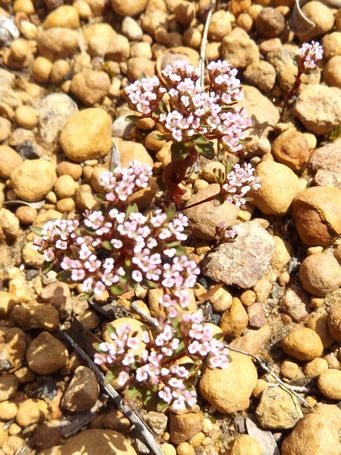
Levenhookia pusilla Midget Stylewort
Very tiny pale pink and white four petalled flowers in a prolific cluster on a short stem,
with oval leaves which redden with age, seen here flowering amongst small gravel stones. "Trigger" looks as if brushed with pink.
October November
Bridgetown, South West region, Western Australia, and occurs throughout the South West, in the Mid West, Wheatbelt,
and south coast to beyond Esperance.
Linum marginale Native Flax, Australian Flax, Wild Flax
A delicate five petalled pale blue flower occurring along long slender
flax like stems, with narrow elongated pointed leaves growing alternatively along the stem. They wave in the breeze
Spring
Bridgetown,
South West, Western Australia and occurring around the coastline from Geraldton and around the south coast to near Eucla, and through
the South West region and into the Great Southern and Wheatbelt.
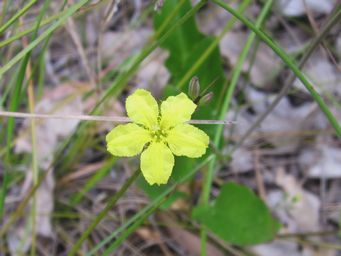
Liparophyllum latifolium 2009 (formerly Villarsia latifolia) UNCERTAIN
Yellow flowers in group at the top of a stem growing from
a plant with irregular spade shaped leaves. The five petalled flower has a thicker section in the centre of the petals,
and a fringe around the centre of the flower. Petals have frilled edges. These flowers are typical of the Menyanthaceae
family, none of which are listed as being found in the Bridgetown area. Menyanthaceae family are wetlands plants.
Liparophyllum latifolium has been chosen as the best match although Liparophyllum violifolium is similar, so I am uncertain.
These were found in a winter wet area.
October
Bridgetown, South West, Western Australia. Range shown as the coastal strip
from Perth to Albany.
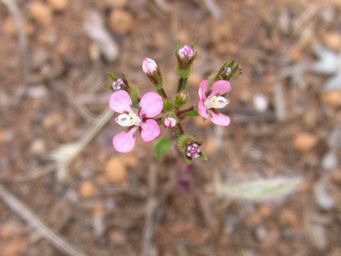
Levenhookia stipitata, Common Stylewort
Very tiny pink four petalled flowers in a loose cluster on a short stem with a few narrow green
leaves. "Trigger" is white.
October November
Bridgetown, South West region, Western Australia, and occurs in areas through
the Gascoyne, Mid West, Wheatbelt, Great Southern and Goldfields regions, ranging from Shark Bay to Esperance
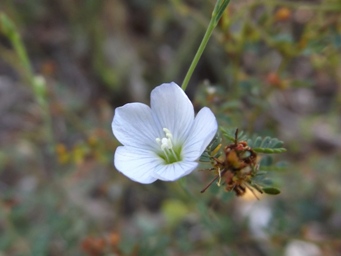
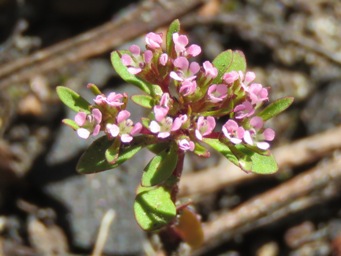
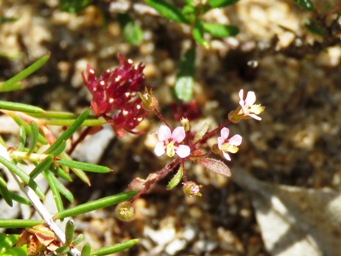
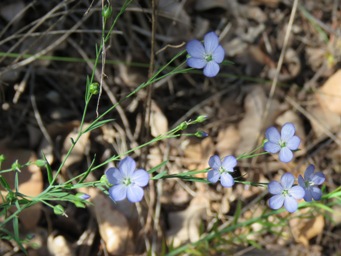
Leucopogon verticillatus, Tassel bush, tassel flower, tassel shrub
Tassel-like strings of tiny pink flowers from the main stem of a
single upright bamboo-like plant
Spring
Bridgetown, South West Region, Western Australia and found in a wide strip following the coast from
Perth to Albany
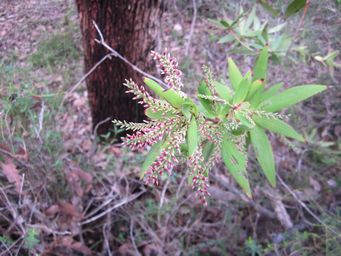
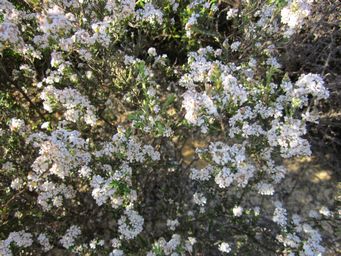
Leucopogon polymorphus
Clusters of tiny tubular white furry five petalled flowers on a low shrub
Spring
Lancelin, and coastal strip
from Leeman to Busselton, with some recorded sightings further inland nd near Albany
Styphelia propinqua, formerly Leucopogon propinquus, see photos and description under S
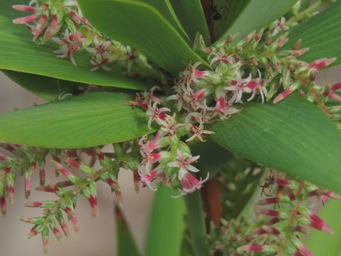
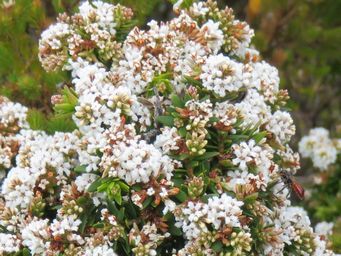
Leucopogon parviflorus, Coast Beard-heath, Native Currant, Duluk.
A coastal shrub with small white flowers, typical of Leucopogon with
five furry petals on a tubular flower. Dense clusters of flowers, from stems with elliptical leaves which point at the tip
March
Albany,
Great Southern Region, Western Australia and occurs along the coastal strip from Geraldton to Esperance
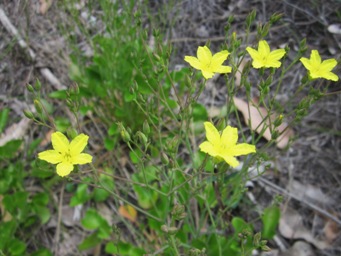
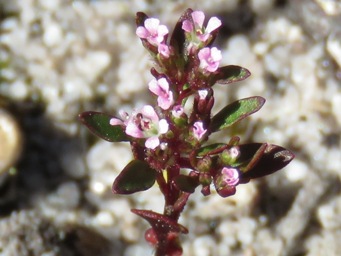
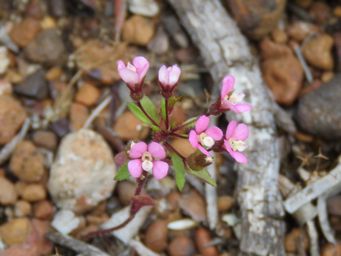
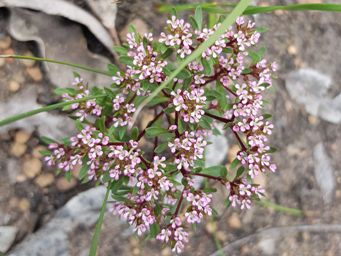
In this case Flax is an apt description, because the Linum genus includes Flax plants grown for fibre.
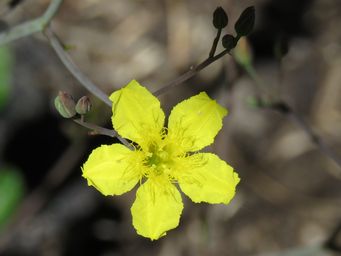
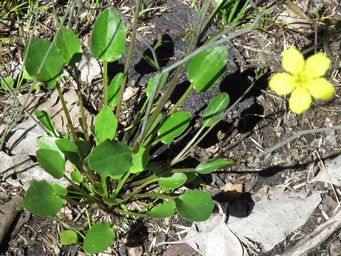
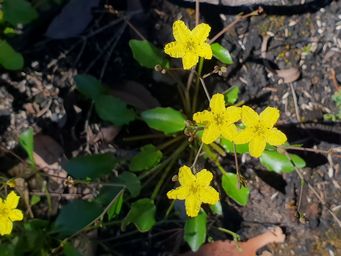
Liparophyllum violifolium 2009 (formerly Villarsia violafolia) UNCERTAIN
Yellow flowers in group at the top of a stem growing from
a plant with irregular spade shaped leaves. The five petalled flower has a thicker section in the centre of the petals,
and a fringe around the centre of the flower. Petals have frilled edges. These flowers are typical of the Menyanthaceae
family, none of which are listed as being found in the Bridgetown area. Menyanthaceae family are wetlands plants.
These may be the similar Liparophyllum latifolium. I am uncertain. These were found in a winter wet area.
November
Yornup,
in the southern Bridgetown-Greenbushes shire, South West region, Western Australia. Found near to the coastal from Gingin
to Manjimup.
The above two are likely the same species, and may be Ornduffia parnassifolia (formerly Villarsia parnassifolia). With seeing,
seeds I cannot be certain between Liparophyllum and Ornduffia.

















